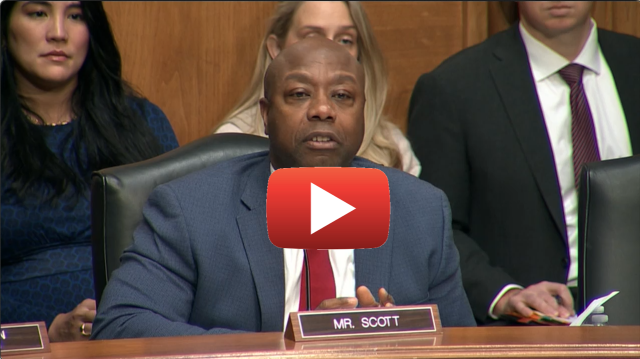- Thursday, January 18th, 2024
Senator Scott Calls for Effective, Tailored Economic Security Tools to Combat China at Banking Hearing
WASHINGTON — Today, U.S. Senator Tim Scott (R-S.C.), Ranking Member of the Senate Committee on Banking, Housing, and Urban Affairs, called for a sharp and tailored use of our economic security tools to maximize their effectiveness against the Chinese Communist Party (CCP). In his opening statement at today’s Senate Committee on Banking, Housing, and Urban Affairs hearing focused on outpacing China, Ranking Member Scott raised concerns over the Biden administration’s decisions that have put politics over policy – from attacks against the legal firearms industry to pursuing the limits of climate and green energy financing – which benefit the CCP at the expense of hardworking Americans. Ranking Member Scott advocated for focusing on countering China and protecting U.S. industry abroad by isolating bad actors through our sanctions policies, restricting malign investment through our Committee on Foreign Investment in the United States (CFIUS) process, and curtailing the export of critical goods and services to our enemies.
Click here to watch Senator Scott’s full opening statement.
Ranking Member Scott’s opening remarks as delivered:
Thank you, Mr. Chairman. Good morning to the witnesses, thank you for being here as well. Thank you Mr. Chairman for this opportunity to talk about such an important topic.
But before turning to this hearing, I’d like to take a moment and draw attention to the recent Iran-backed strikes in Iraq.
Any time American lives are put at risk, whether it’s from Iran or their terror proxies like Hamas, we need to have a strong response. And that starts with this chamber passing my Revoke Iranian Funding Act.
Every dollar that goes to Iran from this Administration’s actions, is a dollar that supports terror. Thank you.
America is the land of opportunity and freedom, the opportunity to innovate, produce, and execute on individual ideas.
These principles are what drives our strides in technological innovation, and our emphasis on entrepreneurship.
We have the strongest economy in the world, driven by its dynamic growth and evolution. We are the global gold standard that countries look on with envy.
However, American exceptionalism is under attack from a country that doesn’t want to play by the rules—that country is obviously China.
To make sure our success does not become the victory of others, the United States government must act strategically and with strength, in protecting opportunities for growth at home and abroad.
When we look at adversaries like the Chinese Communist Party with their centrally planned economy that actively works to distort global markets for its own gain and continuously makes overt attempts to oust us from our perch of leadership.
We don’t’ have to ask the question – are they playing by the rules?
Because we already know the answer to the question, and the answer is emphatically no.
But China’s approach – with their controlled markets, government interventions, and intellectual property theft – is shackled to the openness of others.
So, we must act strategically to ensure that we are safeguarding America’s treasure—our ability to innovate.
We cannot let China continue its malign activities, especially in regards to using, or even stealing, American innovation and American technologies for nefarious purposes, like advancing its rapidly growing military.
So, as we consider American security and prosperity from the Banking Committee’s jurisdiction, we should look first at our economic security tools.
We need to examine the authorities provided to the Executive Branch, how they have been used, and how they can be improved for maximize effectiveness.
However, an over-application of these tools has the potential to push our adversaries closer together and damage the U.S. and our industries’ long-term abilities to innovate and generate jobs and to generate growth.
Therefore, our use of these tools must be sharp but tailored.
Thankfully, we can isolate bad actors through our sanctions policies, we can restrict malign investment through our CFIUS process, and we can curtail the export of critical goods and services to our enemies.
These actions are stronger when we work together with our allies and stay focused on the true problem at hand.
But unfortunately, this administration is yet again, taking the wrong approach.
This administration has put politics over policy, and in some ways, that is playing right into the hands of China.
For example, the Department of Commerce’s Bureau of Industry and Security, the steward of our export controls, is currently engaging in politically motivated attacks against the legal firearms industry.
A troubling trend by this administration’s regulators to try to target lawful businesses through the regulatory process that don’t fit their political narrative.
This undercuts the Commerce Department’s important mission of safeguarding U.S. technology, opening the door for distractions that will allow the CCP to take advantage.
But Commerce isn’t the only perpetrator.
The Department of Treasury’s primary focus appears to be on pursuing the limits of climate and green energy financing policy.
And frankly, these objectives only advance China’s solar and critical mineral energy positions in geopolitical affairs.
Treasury’s time, attention, and taxpayer-provided resources would be much better spent working to ensure our sanctions policies on China remain up to date and promoting as well as protecting American industry abroad.
We need an administration that is focused on countering the real threat—China—not one that is more interesting to politics.
So, while I am grateful that we have such an esteemed panel before us today, I think it is imperative we hear directly from the administration as well.
That said, I look forward to hearing from each of you, and your expertise on the issues that will help strengthen our economy, and strengthen our position against China.
And, importantly, to learning more from their perspectives on how we should act and respond to the threat.
